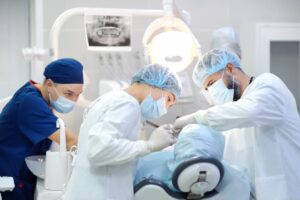
The wisdom teeth are also known as third molars and removal of these third molars is one of the very common surgical procedures in the UK. The wisdom teeth are the last teeth to come through and they grow at the back of the gums. Usually, a wisdom tooth erupts at each corner or quadrant of the mouth. These teeth unlike others erupt through the gums in late teens or early twenties. By the time these teeth start erupting the other 28 adult teeth are already in place and this leaves no room in the jaws for the wisdom teeth to come through in the proper way. Due to this lack of space the wisdom teeth usually erupt at an angle or get stuck. It is also common for these teeth to emerge partially. The wisdom teeth that come through at an angle, get stuck or erupt partially are known as impacted wisdom teeth.
When to make a wisdom teeth appointment with a dentist
You should book an appointment with your dentist if your wisdom tooth or teeth cause severe pain and discomfort. The expert will diagnose the teeth and may even recommend removing those. In case your dentist thinks it is better to remove the erupting wisdom tooth an x-ray of your mouth will be carried out. The x-ray provides the dental team a clear-cut view of your overall mouth including the position of the erupting wisdom tooth. When you are facing wisdom teeth problem you must go to your dentist without any unnecessary delay just as in any other dental problem suggest a dentist who deals in emergency wisdom tooth removal in London over the years. The longer you wait or avoid going to a dentist and get properly diagnosed more complications are likely to crop in along with the usual consequences warns the expert.
The reason of removing the wisdom teeth
Every wisdom tooth does not need to be removed or extracted including those that are impacted and yet do not cause any pain or problem. Actually, there is no proven benefit of extracting the wisdom teeth and rather its removal may lead to unnecessary complications and hassles. However, in certain cases a wisdom tooth removal may become impacted or may fail to fully break through the gum surface. This condition may lead to oral health issues resulting in acute wisdom tooth pain in jaw, suffering and discomfort. Even food can easily get trapped around the edge of the wisdom tooth to create a harmful build-up of plaque. This plaque build-up facilitates a range of oral health issues including the following –
- Setting in of decay in the tooth or dental caries
- Cellulitis – this is a bacterial infection that affects the tongue, cheek and the throat
- Pericoronitis – harmful plaque build-ups create an infection of the soft tissues surrounding the tooth
- Gum disease – it is also often referred to as periodontal infection or gingivitis
- Dental abscess – this condition is a bacterial infection in which pus gets collected in the wisdom tooth or the soft tissues surrounding it
- Development of cysts and benign outgrowths – it is very rare but not completely unknown a wisdom tooth that has not erupted through the gum develops a cyst. It is relevant to mention a cyst is a swelling that is filled with fluid.
Most of the issues mentioned above is cured and cleared away with antibiotic medications and antiseptic mouthwashes. Emergency removal of wisdom tooth is only recommended by dentists when other options do not yield results.
Removal of wisdom tooth – the procedure
A dentist who deals with wisdom tooth removal in London over the years says dentists do remove the wisdom teeth but in certain cases they may refer patients to a specialist surgeon at hospitals. Before starting the procedure, a [patient is told about the procedure and may also be asked to sign up a form of consent. The procedure is performed under the effect of local anaesthesia which is injected to numb the area around the wisdom tooth. Whether a dentist or an oral surgeon removes the broken wisdom tooth pain relief you are likely to experience little pressure before removal of the tooth. This pressure results from rocking the tooth back and forth to widen the tooth socket to make the extraction easier. Depending on the position of the tooth a tiny cut in the gum is required in some cases. The extracted tooth may also have to be cut into tinier pieces for easy removal.
Wisdom tooth extraction takes varying time usually ranging from just a few minutes to about 20 minutes although in some cases it may take even longer. Once the wisdom tooth gets removed from its position in the jaw you will experience some swelling and discomfort both at the site of treatment and the surrounding areas. Even chances of mild bruising cannot be ruled out completely. Usually inconvenience and discomfort resulting from wisdom tooth removal are worse during the first three days or 72 hours says a dentist with years of experience in handling patients in London suffering from wisdom tooth pain. Gradually the condition improves but that may take up to 2 weeks to get completely recovered.
Usual complications involved
Wisdom tooth removal involves some level of risk just like any other case of surgery. Complications or risks that are involved include development of an infection at the site of extraction and delayed healing of the wound caused by removal of the tooth. In fact, these complications are more likely to torment patients who are habitual smokers and stretch the time for recovery.
Dry socket condition is another possible complication in these cases. The condition involves a dull pain in the jaw or the gum and sometimes it is accompanied by a bad taste or smell that originates from the empty socket of the removed tooth. The chances of developing dry socket are more likely if you ignore the aftercare instructions of the dentist.
There is also a chance of nerve damage and this creates a numb or tingling sensation around the tongue, chin, the lower lip, gum and the teeth. Usually, this nerve damage is temporary and the problems sort out automatically with time confirms a dentist who works in the renowned Emergency Dentists London Pro. But in certain cases, the damage can be permanent and may have prolonged impact in one’s life.







